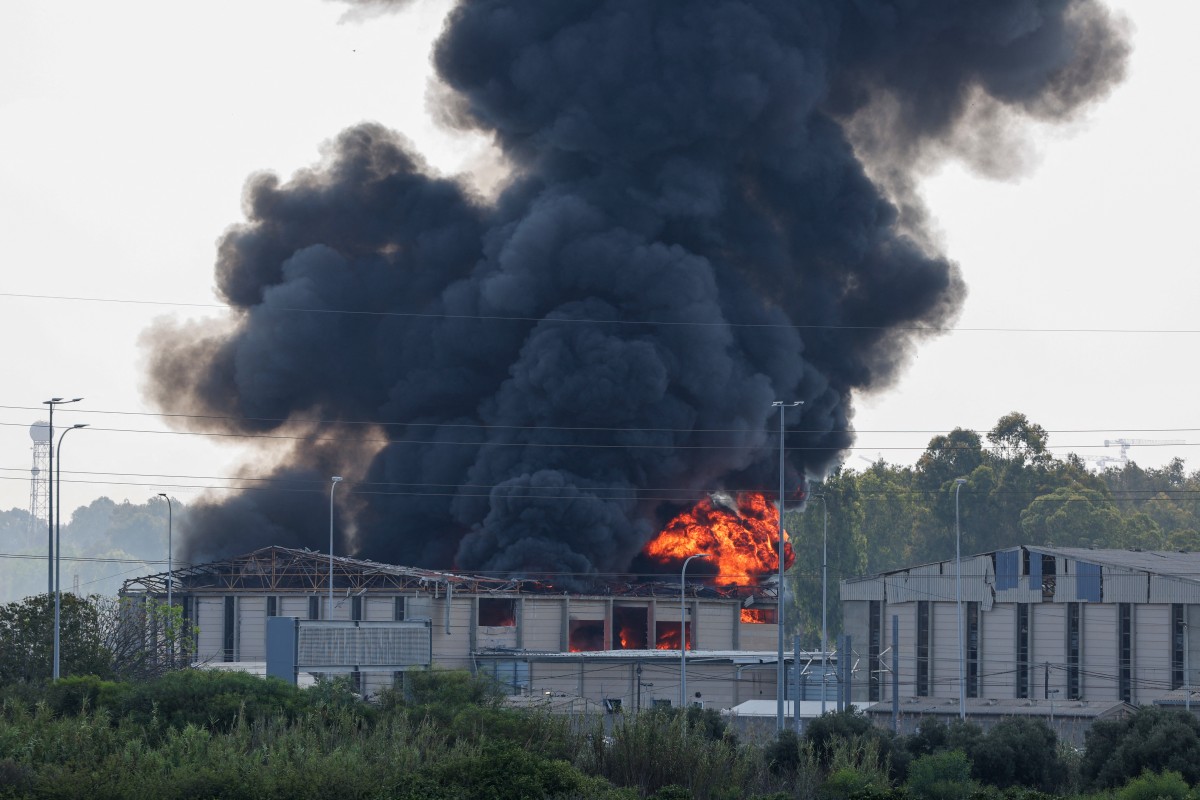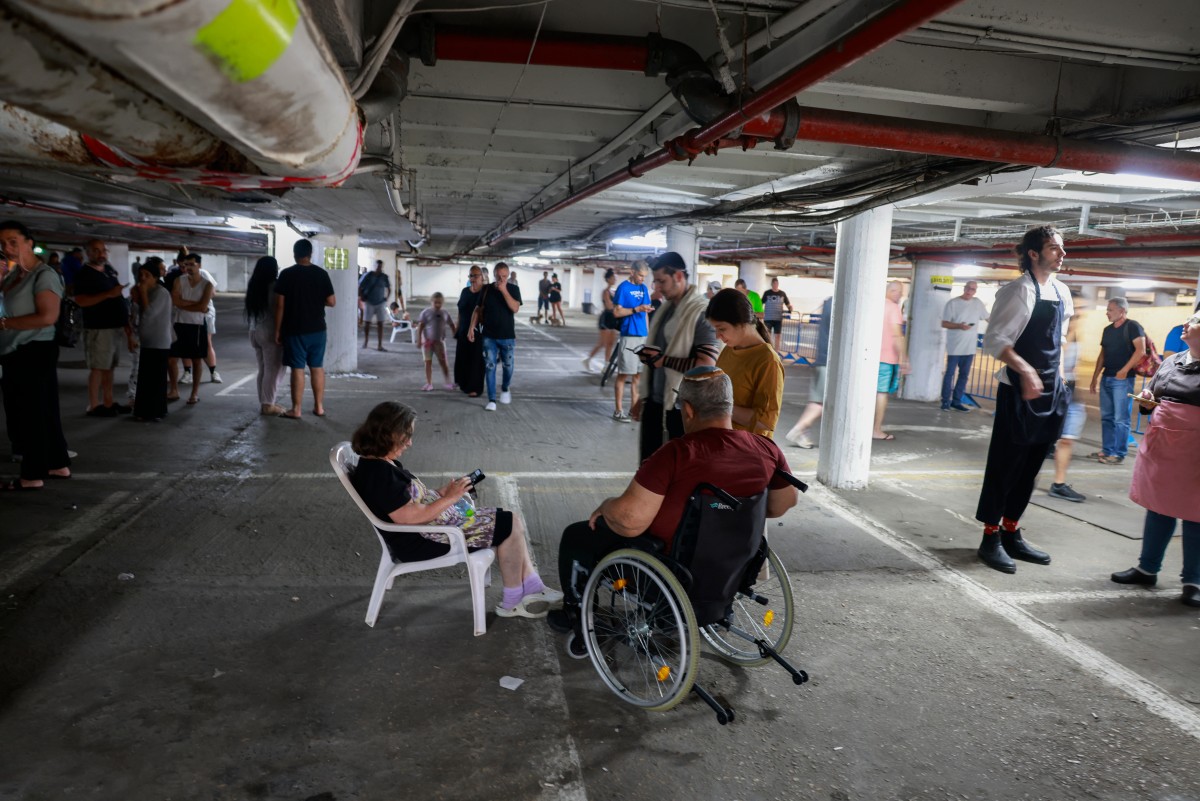
By Agence France-Presse
Israel and Iran exchanged missile fire for a fifth consecutive day on Tuesday, June 17, as U.S. President Donald Trump abruptly left the Group of Seven (G7) summit and warned Tehran residents to “immediately evacuate” amid rising fears of a wider conflict.
The Israeli military said it targeted multiple missile and unmanned aerial vehicle (UAV) sites in western Iran, including surface-to-surface missile infrastructure, surface-to-air launchers, and drone storage facilities, in a statement accompanied by black-and-white footage showing missile launchers exploding.
Shortly after, air raid sirens sounded in parts of Israel. Loud booms were heard over Jerusalem and Tel Aviv, AFP journalists reported, as the Israeli army warned of incoming missiles launched from Iran.
“Sirens sounded in several areas across Israel following the identification of missiles launched from Iran,” the military said, adding the air force was “operating to intercept and strike where necessary to eliminate the threat.”
Around 20 minutes later, the army said people could leave protected spaces. Police said shrapnel fell in Tel Aviv, causing damage but no casualties. The fire service said its teams were on the way to battle a blaze in the commercial hub.
Despite mounting calls to de-escalate, neither side has backed off from the missile blitz that began on June 13, when Israel launched an unprecedented aerial campaign targeting Iranian nuclear and military facilities.
A new wave of Israeli strikes on Tehran—including a dramatic hit on state television’s headquarters that the broadcaster said killed three people—prompted both sides to activate missile defense systems overnight. Israel’s army briefly urged citizens to seek shelter amid growing fears of a regional war.
Pentagon chief Pete Hegseth said the U.S. was deploying “additional capabilities” to the Middle East. The aircraft carrier USS Nimitz left Southeast Asia on Monday, June 16, scrapping a planned Vietnam stop, amid reports it was heading to the region.
A White House spokesperson said U.S. forces remained in a defensive posture.
U.S. leader Trump has repeatedly declined to say whether the United States would support Israeli military action and has insisted Washington was not involved in the initial strikes.
After calling for talks, Trump issued an extraordinary warning on his Truth Social platform: “Everyone should immediately evacuate Tehran!” He left the G7 in Canada early to return to Washington.
Later, he dismissed reports that he left to broker a ceasefire, lashing out at French President Emmanuel Macron.
“Publicity seeking President Emmanuel Macron… mistakenly said I left the G7… to work on a ‘ceasefire,'” Trump posted on Truth Social.
He added, “Wrong! He has no idea why I am now on my way to Washington, but it certainly has nothing to do with a ceasefire. Much bigger than that.. Stay tuned!”

‘One after the other’
After decades of enmity and a prolonged shadow war, Israel launched its surprise air campaign last week, saying it aimed to prevent Iran from acquiring nuclear weapons—an accusation that Tehran denies.
Iran has responded with multiple missile salvos. The Revolutionary Guards vowed on Monday night, June 16, that the attacks would continue “without interruption until dawn”.
The escalation has derailed nuclear talks and stoked fears of broader conflict. Trump urged Iran to return to the negotiating table.
U.S. Ambassador to Israel Mike Huckabee said a missile strike lightly damaged a building used by the American embassy in Tel Aviv. The State Department warned Americans not to travel to Israel.
At least 24 people have been killed in Israel and hundreds wounded, according to the prime minister’s office.
Iran said on Sunday, June 15, that Israeli strikes had killed at least 224 people, including military commanders, nuclear scientists, and civilians. It has not issued an updated toll since then.
Israeli Prime Minister Benjamin Netanyahu said Israel was eliminating Iran’s security leadership “one after the other”.
“We are changing the face of the Middle East, and that can lead to radical changes inside Iran itself,” he said.

‘Stop’ civilian strikes
International calls for calm have mounted. At the G7 summit in the Canadian Rockies on Monday, June 16, leaders, including Trump, called for the “de-escalation” while stressing Israel had the right to defend itself.
“We urge that the resolution of the Iranian crisis lead to a broader de-escalation of hostilities in the Middle East, including a ceasefire in Gaza,” G7 leaders said in a joint statement that also affirmed, “Iran can never have a nuclear weapon”.
China called on Israel and Iran to both “immediately take measures to cool down the tensions” and avoid plunging the region into deeper turmoil.
The United States and Iran had engaged in several rounds of indirect talks on Tehran’s nuclear program in recent weeks, but Iran said after the start of Israel’s campaign that it would not negotiate while under attack.
Iranian Foreign Minister Abbas Araghchi said on Monday that “absent a total cessation of military aggression against us, our responses will continue”.
“It takes one phone call from Washington to muzzle someone like Netanyahu. That may pave the way for a return to diplomacy,” he wrote on X.
A senior U.S. official told AFP that Trump had intervened to prevent Israel from carrying out an assassination of Iran’s supreme leader, Ayatollah Ali Khamenei.
But Netanyahu did not rule out the possibility when asked about the reports during an interview with ABC News.
“It’s not going to escalate the conflict, it’s going to end the conflict,” he said.
